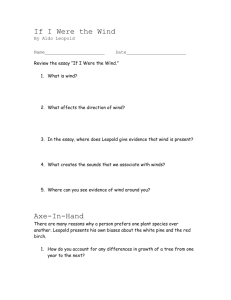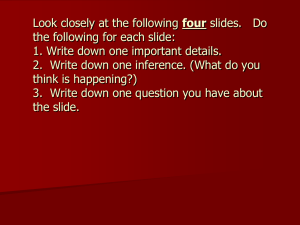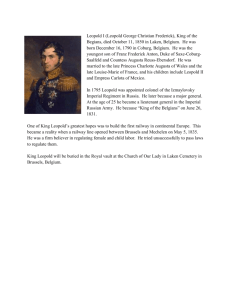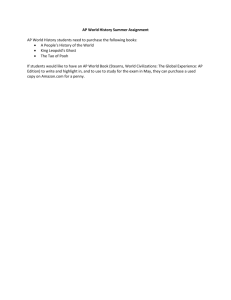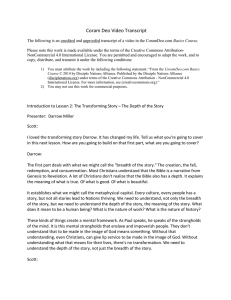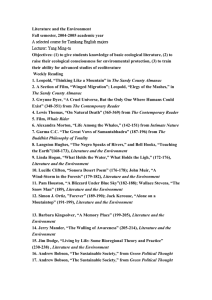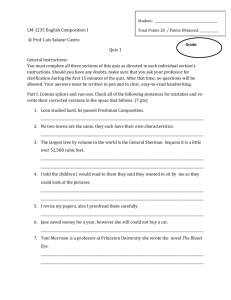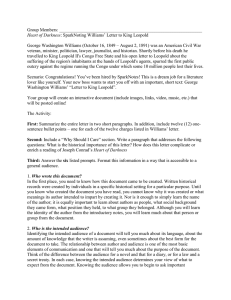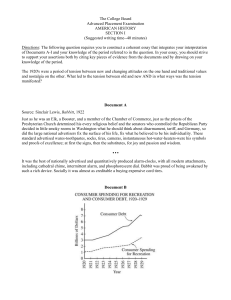Libertarianism__Determinism - darrow3
advertisement
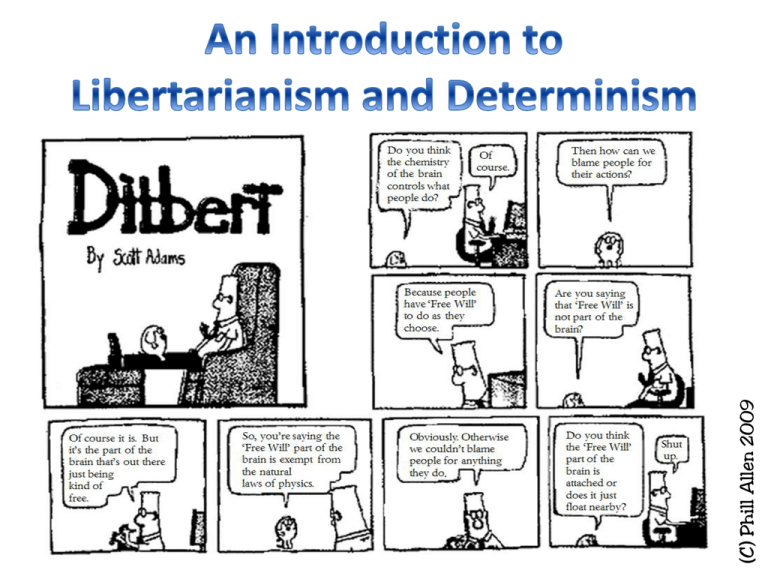
(C) Phill Allen 2009 Rub your hands together vigorously. Describe in detail what just happened and why. The friction that occurred from vigorously rubbing your hands together caused the hands to heat up. There is a theory that everything that happens in the universe has a cause. This is called the theory of universal causation. Without causation, science, which relies on observing and predicting outcomes from identical circumstances, would not work. When an individual is ill, doctors must establish the cause before they can offer a cure. So, can universal causation also be the determining factor in regard to human action? Are humans truly free to make decisions in a given situation, or do all the circumstances that led to that person being in that specific situation, determine an inevitable outcome? The theory that we are free to act as we wish and therefore the individual is morally responsible for their own actions as people are ‘self-determining’, which means they make their choices of their own volition. The theory that all human decisions and actions are determined by other events and actions that happened prior to that moment. This removes any individual moral responsibility as a person’s decisions are determined by external factors. The theory that some human actions are determined by things such as values, desires and prior choices, but that the individual is still free to make a moral choice at the moment of decision and thus is morally responsible. When referring to a person’s free will, people often assume it equates to some kind of permission slip; ‘I want to do this, I have free will, therefore, I can.’ But just how free are we to make our own choices? Can you choose to fly, for instance, become God or even the Pope? Free will can only work in the parameters of the surrounding influences that may indeed limit it. Give an example of such limitations from each of the following influences: Family Genetics & Environment Natural Law Society Religion Conscience Consider: An army sniper is stationed on a roof in Baghdad. He looks through his scope, aligns his target, squeezes the trigger and shoots dead an innocent civilian. Q. Just how culpable is he? Task: Place the scenarios below in order of how much the soldier is to blame for his actions. The soldier was acting on an order from his superior officer. Most Blameworthy The soldier had been threatened with execution if he didn’t obey his orders. The soldier intentionally shot the innocent civilian. The soldier shot the innocent civilian by mistake. The soldier, was hallucinating after having taken some drugs. Least Blameworthy Q: How would a libertarian, a hard determinist and a soft determinist view this situation and how might they justify their thinking? ASBO family banned from borough A family of five have been banned from harassing anyone in England and Wales and also banned from their home borough of Wirral. A court was told the Bridge family's neighbours in Grosvenor Road, New Brighton, had "lived in fear" of them. District Judge Nick Sanders issued the ASBO on Thursday at Birkenhead Magistrates Court. It affects John Bridge, 40, his wife Karen, 37, and their sons John Jnr, 20, Alan, 18, and Luke, 16. The family were alleged to have been involved in threatening and violent behaviour, verbal abuse, intimidation and criminal behaviour, including dangerous driving and organised vehicle crime. The reputation of the family is very strong and residents were incredibly frightened of reprisals. John Jnr and Alan are currently serving prison sentences and, along with their parents, are banned until September 2012, while Luke has been banned from returning to Wirral until March 2009. [BBC News Archive September 2006] Suppose during the hearing John Jnr, Alan and Luke had claimed that they were not to blame for their actions as they were a product of their upbringing. Task: In groups prepare a case both for the prosecution and defence using the three views on moral responsibility you have looked at so far. CLARENCE DARROW A HARD DETERMINIST Who was Clarence Darrow? • Born in Ohio, USA, in 1857. • Studied law and started practising in 1878 in Chicago. • Well known for his clever speech and quick wit in the court room. Darrow’s View on Determinism WHAT WE DO AND THE WAY WE ARE COMES DOWN TO LUCK WE ARE NOT RESPONSIBLE FOR OUR HEREDITY OR OUR ENVIRONMENT THIS IS A YET THESE FACTORS DETERMINE OUR CHARACTER, CHOICES, HARD DETERMINIST ACTS AND EVEN OUR VIEW THOUGHTS CRIMES SHOULD BE VIEWED IN THE SAME WAY AS EARTHQUAKES OR HURRICANES ONLY NATURE AND NURTURE ARE TO BLAME. • https://www.youtube.com/watch?v=QQzN9m tvLvM The Leopold-Loeb case • In 1924 in Chicago, 14 year old Bobby Franks was kidnapped and brutally murdered on his way home from school. • The murderers were soon caught, but everyone was shocked at their identity. They were two bright teenagers from wealthy families, living lives of privilege. • Their names were Richard Loeb and Nathan Leopold. • Loeb was 18, and the youngest graduate in the history of the University of Michigan. • Leopold was 19, and already a nationally renowned ornithologist and University of Chicago graduate. He was getting ready to start Harvard Law School. • The two brilliant young men formed a bizarre relationship. They followed the teachings of Nietzsche, especially his idea of the Super Man, and planned to commit the perfect murder. • They kidnapped Bobby Franks, whom they knew slightly, beat him over the head and suffocated him with a gag. They attempted to bury his body in a swamp, then made a ransom demand to his family. • However, Leopold’s spectacles were discovered next to the body. • As soon as they were presented with this evidence, the teenagers confessed. • Everyone demanded the death penalty. Enter Loeb and Leopold’s defence lawyer – Clarence Darrow. • He knew the teenagers were guilty and did not argue with any of the evidence. • He put forward a ‘guilty’ plea, rather than the ‘not guilty’ plea that everyone expected. • He waived their right to a jury trial and tried their case directly to the judge. • His arguments in defence of Loeb and Leopold reveal his hard determinism. Darrow argued that, although the young men had murdered Bobby, it was not their fault. He blamed a variety of outside factors: THEIR THEIR THEIR THEIR YOUNG PARENTS WEALTH NANNIES AGE THE TRIAL BECAME A MEDIA SPECTACLE WORLD WAR 1 THEIR HORMONES DETECTIVE NOVELS NIETZCHE COLLEGE PROFS • During the 12-hour hearing on the final day, Darrow gave the finest speech of his career. It included the following: THIS TERRIBLE CRIME WAS INHERENT IN HIS ORGANISM, AND IT CAME FROM SOME ANCESTOR… IS ANY BLAME ATTACHED BECAUSE SOMEONE TOOK NIETZSCHE’S PHILOSOPHY SERIOUSLY AND FASHIONED HIS LIFE UPON IT?...IT IS HARDLY FAIR TO HANG A 19 YEAR OLD BOY FOR THE PHILOSOPHY THAT WAS TAUGHT HIM AT THE UNIVERSITY! • In the end, Darrow succeeded. • The judge sentenced Leopold and Loeb each to life imprisonment for the murder, plus 99 more years each for the kidnapping. • Against the odds, the teenagers had avoided the death penalty. • Loeb was later killed in a prison fight and Leopold was released from prison in 1958. • The outcome of this trial still has consequences today. • Darrow was the first lawyer to suggest that a defendant might not be responsible for his crime because of his inherited traits – or ‘broken machines’, as Darrow called Loeb and Leopold. • The trial raised the issue of whether humans are predetermined by nature or nurture to act in certain ways.
